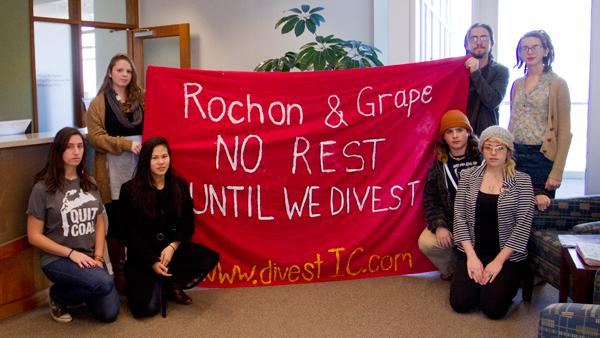On the last day of March, Syracuse University announced it will be divesting — or withdrawing its endowment fund investments — from coal and other fossil fuel companies. The Orange Nation is joining a growing list of colleges and universities who are taking this step, in addition to municipalities, religious institutions, foundations and more.
The movement to divest has primarily been led by college students and broadcasted by environmental activist organization 350.org. With hundreds of active student organizations across the country, sit-ins, marches and banner drops are becoming more and more common.
The City of Ithaca is on the list of municipalities who have divested, and the Park Foundation — an invaluable financial source for the Park School of Communications and Ithaca College as a whole — is among the list of divested foundations. The college, however, is nowhere to be found on 350’s “Divestment Commitments” list.
The college’s student organization aimed at pressuring administration to take this step, Divest IC, has faltered and become inactive. Without it, President Tom Rochon and the Board of Trustees are off the hook.
How did this happen? The biggest reason seems to be that student leaders struggled to open the doors of discussion with the Board of Trustees. In a Feb. 2014 letter to the editor, Rebecca Billings, ’14, said attempts to create dialogue with administration were often ignored.
“We are often met with roadblocks in this process, as our attempts for open dialogue with the board and administration have been repeatedly ignored and cut off,” she said. “We hoped to work alongside the board and administration to make it a reality, but they continue to ignore our emails and steps toward collaboration.”
As an activist myself, I know how difficult a lack of response can be, and how quickly it can take the momentum out of a movement.
Students involved in divestment also received criticism that they didn’t know enough about the process and that their goals were unrealistic. In an article in The Ithacan about a student protest at Rochon’s office in 2012, Carl Sgrecci, now retired vice president of finance and administration, is quoted saying the college’s investment in fossil fuel companies makes up “half of one percent” of the endowment investments.

According to the college’s website, the endowment for the fiscal year of 2014 was $268,214,127. If Sgrecci’s statement still remains true, that means as much as $1.3 million is being invested in the fossil fuel industry. Suddenly “half of one percent” doesn’t seem so small.
While that may be a lot of money to the average person, what’s $1.3 million to the fossil fuel industry? Not even a penny. But bankrupting the industry is not the point of the divestment movement.
On its website, Exxon Mobil said divestment is “a movement that is out of step with reality … To not use fossil fuels is tantamount to not using energy at all, and that’s not feasible.”
The point of the divestment movement is to fight this sort of mindset. A clean energy future is possible through a combination of renewable technologies and a restructuring of our current, energy intensive way of life. By pulling monetary support, a message is sent that we are ready to move forward into that next stage.
In my work as a journalist, activist and student, I have become familiar with the college’s Climate Action Plan to be carbon neutral by 2050. To achieve neutrality, the plan explores a myriad of possible actions: installing renewable energy on campus, developing behavior change programming and purchasing carbon offsets, to name a few. However, the plan, approved by the Board of Trustees in 2009, makes no mention of divestment.
I would find it quite impossible to claim carbon neutrality while still investing money in the fossil fuel industry.
Among the reasons for becoming carbon neutral stated in the action plan, benefiting others is one.
“Just as we expect our students to utilize their acquired competence for the benefit of others, our Climate Action Plan is an exercise for the benefit of other educational institutions and the world,” the document says. “Rather than wait for environmental mandates, we act now out of a sense of shared responsibility.
Fossil fuel extraction and production does not occur on a different planet, nor strictly in remote, lifeless places on our own planet. It happens in the same places where ecosystems thrive and where humans live. These fuel sources come with a price of life, and that includes human life. In our daily lives we often don’t see the other side of our light switches and car ignitions, but after walking across the country in the Climate March, I saw the other side and the communities suffering from it. It’s not pretty. It’s not humane.
One of the best things Ithaca College can do to fulfill its goal of benefiting others, in specific regards to communities and individuals affected by industry and climate change, is to remove all ties to fossil fuels. That includes divesting our endowment.
This is also one of the best ways the college can show that it cares about the futures of its students after they leave. The effects of climate change are something we are going to be dealing with for the rest of our lives.
This cannot be done without students demanding it, and it cannot be done without the college developing a space for students to be heard. Determination is needed; discouragement is not an option. As stewards of the planet and the future, our only option is to win. That is our shared responsibility.
As for claims that divesting is too difficult? I find that hard to buy when it’s being done across the country and the world, including our Orange neighbors to the north. That claim has gone from being a reason not to divest to an excuse.






